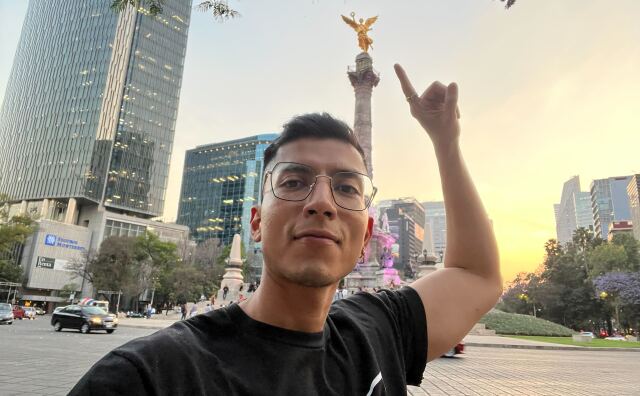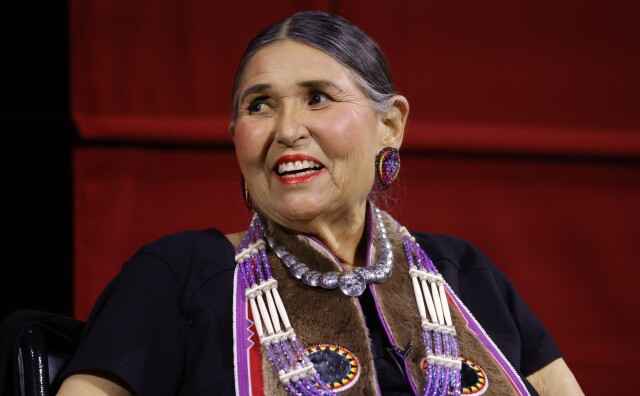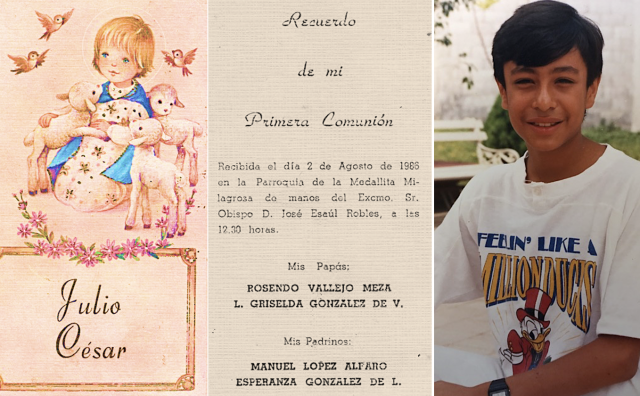I wonder what would have happened if my parents hadn't moved to the Jefferson Park area of Los Angeles after driving out here from New Orleans.
What would have happened if they had moved to Palm Springs as my mother wanted to do?
-
From June 2020 to July 2021, we published your stories each week to continue important conversations about race/ethnicity, identity and how both affect our lived experiences. We now have a new series Being American, which is again soliciting your essays.
-
Read:
How would Hillary, my oldest brother, have handled that? How would that have felt, being largely in a world of whites while looking like the whitest white boy when you thought of yourself as Black? How would that have felt like in a Frantz Fanon dialectic? Would his identity have fractured into a million shards of conflicting iterations of self? Would he have gone mad and disfigured his face that resembled that white boy's face on the advertisements for earning your high school diploma through the mail?
Hillary, my oldest brother by almost 10 years, presented so white that he was cast in "The Spook Who Sat By The Door" just by standing in the unemployment line at age 25 in 1972. A casting agent magically appeared and asked him if he wanted to be in a movie. "We need some light skin n***ers," he told him. I assumed the guy doing the casting was Black, but I never got around to asking.

Soon as the film came out, Mama told us we needed to get to the Centinela Drive-In and see it before "The Spook Who Sat By the Door" was pulled from theaters because white racist Los Angeles Mayor Sam Yorty said it was inflammatory and would incite another riot. I remember a full drive-in that night, every parking space taken, cars as far as the eye could see -- and then it was gone for decades, until Tim Reid brought it back out on DVD.
JEFFERSON PARK
The rest of the family didn't have the cognitive dissonance that Hillary experienced. Gregory, the second oldest, looked Black enough and had an Afro and played football.

Jeffery, the third oldest, was five years older than me and was born a woodsman or a carpenter, though chemistry and physics came easily to him. He liked ping-pong and watching television with Mama and sleeping like a dead man. Race ambiguity didn't seem to affect him, maybe because people realized that maybe he wasn't to be f**ked with.
Jeff was almost as white-looking as Hillary, and he wore a huge peacoat even when it was warm, and thick corrective shoes that made him look a little like Frankenstein, and his Afro was a solid block of feral hair. I think that alone was enough to make the casual bully keep a distance between them.
Me? I had more problems to consider than how people saw me.
I heard voices and had to sleep with my mother until I was eight and ate everything to calm myself. I was afraid to die, like it could happen at any second, and it didn't help that I loved reading "Dracula" and the books of H.P. Lovecraft.
My parents knew I might be damaged goods so they wrapped me in layers of love and concern, and eventually I grew out of being panicked by my own thinking. Almost accidentally my unhinged gothic imagination lost its power over me and I could breathe and think things outside of my fears. The nuclear siren testing on the first Tuesday of the month (or was it the last Thursday of the month?) no longer terrified me. I was no longer the one kid in junior high thinking the world would end before I ever kissed a girl.
But back to race ambiguity.

My mama hardly ever used the term Creole unless it was about food. She was OK maybe with colored or Negro, but never Black.
Race ambiguity wasn't on the top of my lists of things to worry over until my eighth grade English teacher said she had just come back from Paris, and pointed at me and said, "A lot of the boys I saw in Paris looked just like you, with your rosy cheeks."
I could hear the snarls of the hood rats in the back of the class who were looking forward to punching me in the face for looking like a Parisian boy.
The truth is I have no French ancestry. I am 42% West African, and the rest Spanish-Portuguese and Irish-English. A good part of my genome is the path of the slave trade, and my ancestry is largely a product of the slave trade, but I didn't care about that as a boy. I just wanted to hide from accusations of having rosy red French boy cheeks.
THE SISTER
My parents sent me to Holy Name of Jesus Christ I Wept Elementary and things didn't go well (I added the "I Wept" part). My first grade teacher didn't think much of me. Actually, she thought I was what she politely referred to as "retarded" and that I should be held back, and told this to my mother. Bad idea on her part.
Lolita Teresa Villavaso Tervalon waited for opportunities to concentrate all of her considerable wrath at anyone who deserved it. I wonder how this nun couldn't have sensed that my mother was a volcano of rage who had already decided that the nun hated Black people, and that she hated me because I was lighter than she was. The nun might have been Filipina, I'm not sure. Maybe she'd grown up around caste-like notions of skin color. It was complicated racial mathematics. But even if working from flawed premises, Mama often came up with the right conclusions. She had some kind of radar for confrontation, and once alerted to it, headed straight for it as though it was her calling.

I fell asleep in class sometimes, and didn't know how to be a first-grader since my mom had me skip kindergarten to spend more time with her. Then, one day I ate something that disagreed with my stomach in the school cafeteria, and I vomited.
The nun had me clean it up, instead of the custodian.
I don't remember telling Mama about getting sick and making a mess and having to clean it up, but she somehow knew and the next day she requested a meeting with the nun, who met with us before class. She didn't have the sense to be afraid of Mama, but Mama didn't take long to put the fear of God into the nun's heart.
"Sister, did Jervey throw up in the cafeteria?"
The nun, sensing that my mother was in a murderous rage, mumbled a reply.
"What?" Mama pressed her.
"He did," the nun replied.
"Did you make him clean it up?"
The nun was smart enough to know my mama was close to erupting and tried to slide over to the door for a hasty exit, but Mama had outmaneuvered and blocked her.
"Let me explain this to you, Sister. If you make my child clean up his own vomit again, I'll rip your veil off and put your face in it. You understand me, Sister?"
The nun stood there mouth hanging open, terrified to move. I was embarrassed and confused but also proud.
My mama, my brutal hero.
PUBLIC SCHOOL
So I got yanked out of Catholic school because my mama threatened the nun and I was transferred to Sixth Avenue Elementary School.
Somehow my parents didn't seem to think it was that big a deal of change, though I didn't even know how to find my way there. Onla, the boy across the street I played with, did though, and I followed him the four blocks to the school. Those were eventful blocks. One time Tommy, another kid, had his puppy follow him to school and a speeding police car hit it in front of us, and it exploded into tiny parts and a mist of blood. The cop stopped and picked up the remains and put them into a bag, tossed it into his trunk, said, "Sorry," to Tommy and drove away. Tommy said, "I didn't like that dog anyway."
Another time, when Mama was too busy dealing with getting Daddy moved out of the house, she forgot to give me a belt for my new baggy pants, and on the way to school my pants fell down around my ankles on Jefferson Boulevard, and like a second-grader I stood there crying. This man appeared and tied my pants with a string he happened to have, and I stopped crying and walked to school.
MORE FROM OUR RACE IN LA SERIES
- How An ER Doctor Combated Racism In Pursuit Of An Olympic Dream
- A Baby Boomer's Recollection of Systemic Racism And The Police
- Rising Above: How I Found My Voice To Push Back Against Stereotypes, At Work And In Life
- Reading About Anthony McClain Felt Like Reading My Own Obituary
- 'Who Invited Miami?': An LA Transplant On The Rules of Racial Division -- And How We Can Bend Them
- No Soy de Aquí, Ni de Allá (Not From Here, Not From There)
- 'We Don't Hire Colored Girls': After A Job Rejection In 1956, A Young LA Telephone Operator Began Kicking Down Doors
- Dear Racist': How Rage-Writing Turned To Rage-Drawing For An Artist Who's Fed Up With Anti-Asian Hate
- How To Participate In Our Series
This world was largely of one color; I don't even remember white teachers. The only non-Black people were the Japanese who still lived there in the Jefferson Park neighborhood. If you did see a white person, it probably was somebody like my mother who looked white but was Negro, as she would have said. This was my world, our world. Isolated from greater L.A.
My mother's last name was Spanish, but no one spoke Spanish in my family, though a few people in the family knew French. We spoke the New Orleans dialect that, if you don't know it, sounds as high as dogs howling the way my brother Jeffery spoke it. I tried to get rid of my New Orleans accent soon as I realized no one in the world, except for my family, called their Mama "Ma'mer" or, when they went shopping, they were going to "make groceries."
MR. MARTIN
My reputation as a dull-witted troublemaker preceded me.
Years later, I learned that I was burdened with a "serious learning disability and free-floating hostility" -- all that from that nun getting back at my mother and me. She had sent on to my new school a warning about my dangerous behavior, and of having a mother who, you know, was willing to go that extra mile to threaten a nun for lying about her son being "retarded." And so I was given Mr. Martin, the sternest teacher in the school.
Walking into his class was different; the boys were all on their best behavior. The girls were quiet too, in their cute dresses and plaited hair. Everybody was scared of him. Mr. Martin didn't play, not at all. Words were few, but, if you didn't listen, he'd march you to the front of the class and bend you over and swat your ass. He meant for it to really hurt.
I don't remember but one Black male teacher at the school, and that was Mr. Martin. He was a handsome dark-skinned man who wore suits and who was the disciplinarian to seemingly all the Black boys in the school. I didn't cause him problems but he did have to, even reluctantly, swat me for not paying attention to the day's lesson.
He played tapes of Dr. King giving uplifting speeches and he didn't tolerate foolishness, so we listened as though our asses depended upon it. He'd constantly admonish us about the importance of education, and that if we didn't educate ourselves, we were going to live bad lives and go to jail or worse.

I didn't know who Dr. King was at that time, but when I did learn about him and all he accomplished, I thought of Mr. Martin as our MLK.
Mr. Martin was tough and swatted our asses, but he was doing his best to prepare us for the attrition that was coming: that some of us would be spirited away to while away our lives behind bars -- and this was only the second grade.

He was right though, in that many of the folks I knew then are dead or are shells of themselves. The most rational thing to think is that the broader society didn't have any use for us, except to fight its wars and fill its prisons. As Slick Rick sang in "Children's Story" back in 1988, "Walk the straight and narrow or your soul gets cast."
And as super careful as I was, I could have been devoured too. I once brought an ounce of horseweed to high school to give to somebody I can't remember, as a favor for somebody I can't remember. If I had been caught my future might have evaporated like spit on a hot day.
But it didn't. I got lucky. Later on a counselor, Mrs. Lowery, at Dorsey High noticed that I always had a book, and I liked to read, and it became a question of why I was not in college prep courses. The nun at my old school had tried to decide my future. Teachers like Mr. Martin and Mrs. Lowery let me decide it for myself.
A librarian named Mrs. Gold (the mother of the late, great Jonathan Gold) saved little poot butt nerds like me by giving us a safe place to read. And they were other generous souls, teachers named Klewitz and Soloff and Delouise and Feldman, white teachers who treated me and my classmates as though they liked us, cared about us, and wanted the best for us.
After I sold my first novel, I thought of contacting Mr. Martin, but I was sad to hear he had passed away. I wish I had the opportunity to thank him for confirming what he tried to beat into our thick heads: that life was a minefield and if we wanted to get through, we needed to be better than good and hella lucky.
ABOUT THE AUTHOR:
Jervey Tervalon is the award-winning author of several books, including "Monster's Chef," the L.A Times bestseller "Dead Above Ground" and "Understand This." He also co-edited the anthology "The Cocaine Chronicles." Jervey is the founder LitFest Pasadena and Locavore Literary Los Angeles (formerly Literature for Life), an online literary magazine and salon. He teaches at the College of Creative Studies in Santa Barbara. Jervey was born in New Orleans, raised in Los Angeles, and lives in Altadena with his family.








